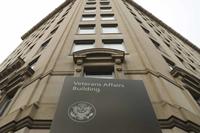SPRINGFIELD, Ill. — Sluggishness, poor compliance with existing rules and little help from state public health officials crippled the response by Gov. J.B. Pritzker's administration to a November 2020 COVID-19 outbreak at a northern Illinois veterans home that claimed 36 lives, according to a state audit released Thursday.
The review by Auditor General Frank Mautino contends the Illinois Department of Public Health “did not identify and respond to the seriousness of the outbreak." For nearly two weeks after the problem was identified Nov. 1 at the LaSalle Veterans Home, IDPH officials failed to visit the site and offered no assistance. LaSalle staff testing for the virus was slow and poorly coordinated, the review said.
In total, 85% of the home's 128 residents and 38% of its 231 staff members contracted the illness during the outbreak, which Mautino noted occurred when infections statewide were rising rapidly and there was yet no preventive vaccine.
Pritzker, a Democrat, blamed Republicans who opposed tactics to stop the spread of COVID-19, suggesting non-compliant visitors unwittingly carried the virus into the LaSalle home.
“We were working against Republican elected officials who told people to defy mitigation efforts...,” Pritzker told reporters at the Capitol. “Republicans told them that they did not need to wear masks. They told people that they didn’t need to get vaccinated. They told people that COVID wasn’t serious. Those lies put people’s lives at risk, especially the most vulnerable.”
But an April 2021 report by the inspector general of the Department of Human Services reported that during an onsite visit, which didn't occur until Nov. 12, officials discovered ineffective, alcohol-free hand sanitizer in abundant use and no one responsible for replacing it, staff members reporting for duty by taking their own temperatures and initialing results, and scant availability and use of personal protective equipment such as face coverings.
Mautino reported that LaSalle administrators had reams of COVID-19-specific guidelines for stopping the spread available from both federal and state experts, as well as long-established pre-pandemic infection control policies.
Pritzker, who later acknowledged “some management faults” were to blame and said that as governor, “I understand that these agencies are my responsibility,” maintained that he held staff accountable, including firing LaSalle director Angela Mehlbrech in December 2020.
However, he said that to the extent that IDPH is at fault for not providing more assistance, the agency controlled the entire state response during the pandemic's worst surge and was dealing with hot spots in every direction. But at no time during the fall of 2020 or at any time during the pandemic did Pritzker or his team suggest IDPH couldn't keep up.
IDPH couldn't have been caught off-guard despite the precipitous statewide surge. The audit reports that the Pritzker administration was monitoring COVID-19 in 710 long-term care facilities across Illinois. The first week of November, 2020, only four of them reported more than 50 new cases and LaSalle was the only facility with more than 100.
That was a red flag that should have generated an alert and immediate administration response, Mautino said in an interview.
Rep. Lance Yednock, an Ottawa Democrat who led the House call for Mautino's audit, lamented a breakdown in inter-agency coordination which “very likely led to more sickness and deaths." However, he acknowledged that “the terrifying speed of infection” might have rendered the best preparation inadequate.
Mautino's auditors found that last year's inspector general's report had wrongly tainted Anthony Kolbeck, then chief of staff for Veterans' Affairs. Instead of tracking the outbreak, Mautino reviewed scores of emails and determined that Kolbeck reported to IDPH regularly on the situation from its inception. When IDPH didn't act, the audit said Kolbeck requested the agency make a site visit and sought information on rapid tests and antibody treatments.
Kolbeck nonetheless resigned in the weeks following the outbreak's fallout. So did then-Veterans Affairs Director Linda Chapa LaVia, whom Pritzker replaced in spring 2021 with Terry Prince, a 31-year Navy veteran and former senior adviser to the U.S. Surgeon General.
Steve Levin, a Chicago attorney representing 27 families who filed a lawsuit against the state for the loss of loved ones at LaSalle, said the audit's finding of “extreme negligence is another painful reminder to the families that this was a preventable tragedy.” He demanded Pritzker negotiate a settlement to avoid a lengthy court battle.














